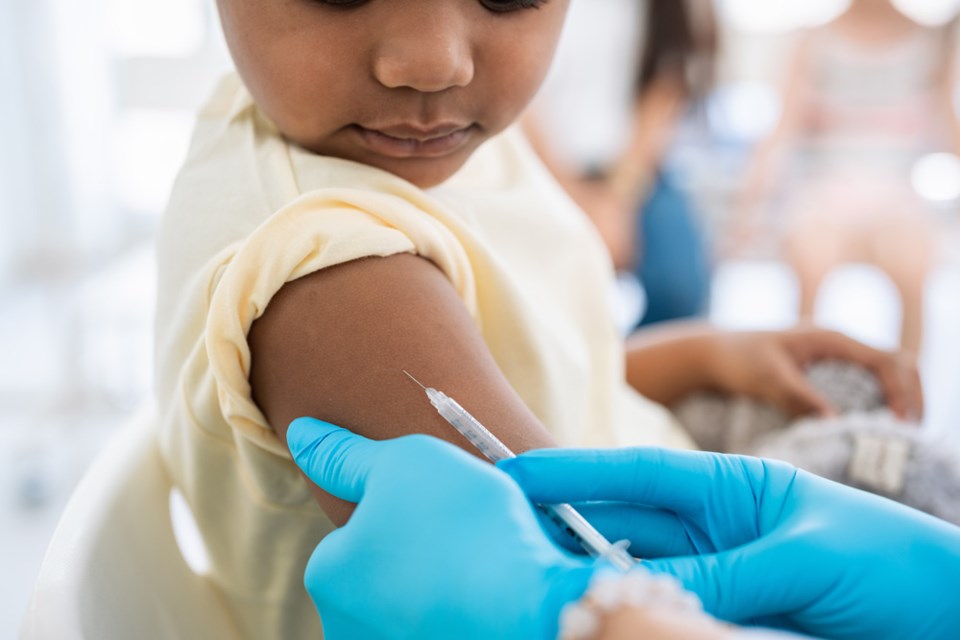A "tripledemic" of COVID-19, influenza and RSV continues to take a heavy toll on B.C. children — but it's not driving up vaccination rates among New Westminster or Burnaby families.
The first B.C. Centre for Disease Control's first vaccine progress report of 2023 shows the province hasn't made much headway among children and teens in its push to have people get their COVID-19 vaccine boosters.
New Westminster has the highest rates of pediatric COVID vaccination in the Fraser Health region (the area from Burnaby to Hope) — but, even at that, rates remain low as of the latest reported data (as of Jan. 4).
- Among the youngest children (zero to four), just 26 per cent of New Westminster children have one dose of COVID-19 vaccine — up from 25 per cent heading into Christmas — and just 14 per cent have two doses, the same as before the holidays.
- For the five-to-11 age group, rates are somewhat higher, with 63 per cent having one doses and 54 per cent having two doses. Just 26 per cent, however, have received the booster shot. All those numbers remain unchanged since Dec. 22.
- Vaccination rates were significantly higher for youth in the 12-to-17 age group, with 90 per cent having one dose, 86 per cent having two doses. Again, however, booster shot take-up has been low, at just 49 per cent — unchanged since before Christmas — and only 20 per cent have received the fourth dose.
Burnaby lags just slightly behind New Westminster on all fronts.
- Among the youngest children (zero to four), just 23 per cent of Burnaby children have one dose of COVID-19 vaccine and just 11 per cent have two doses.
- For the five-to-11 age group, rates are somewhat higher, with 62 per cent having one doses and 52 per cent having two doses. Just 24 per cent, however, have received the booster shot.
- Vaccination rates were significantly higher for youth in the 12-to-17 age group, with 89 per cent having one dose, 85 per cent having two doses. Again, however, booster shot take-up has been low, at just 48 per cent, and only 17 per cent have received the fourth dose.
B.C. kids, teens aren't getting COVID vaccine boosters, data shows
Both cities, however, have much higher rates than British Columbia as a whole.
- The 0-4 age group has just 19 per cent of children with one dose and nine per cent with two.
- Among the five-to-11-year-olds, it's 52 per cent with one dose, 42 per cent with two doses, and 18 per cent with three doses.
- The 12-to-17-year-old group has 83 per cent with one dose and 79 per cent with two doses, then drops off sharply for booster shots: 37 per cent with three doses and just 13 per cent with four.
Rates for influenza vaccination haven't been broken down by region, but the provincewide take-up has been low among children and youth: 26.3 per cent for the youngest age group (six months to four years), 22.6 per cent for the five-to-11 age group, and just 16.9 per cent for the 12-to-17 bracket (as of the latest reported data Dec. 12).
At a news conference yesterday (Jan. 5), Health Minister Adrian Dix continued to push the message that all British Columbians should get their COVID-19 booster shots in the face of the continued respiratory illness surge.
Today, the province announced it's reactivating emergency operations centres at 20 of B.C.'s largest hospitals, including Royal Columbian Hospital in New Westminster, to cope with the continued strain on the health-care system.
Follow Julie MacLellan on Twitter @juliemaclellan.
Email Julie, [email protected]



